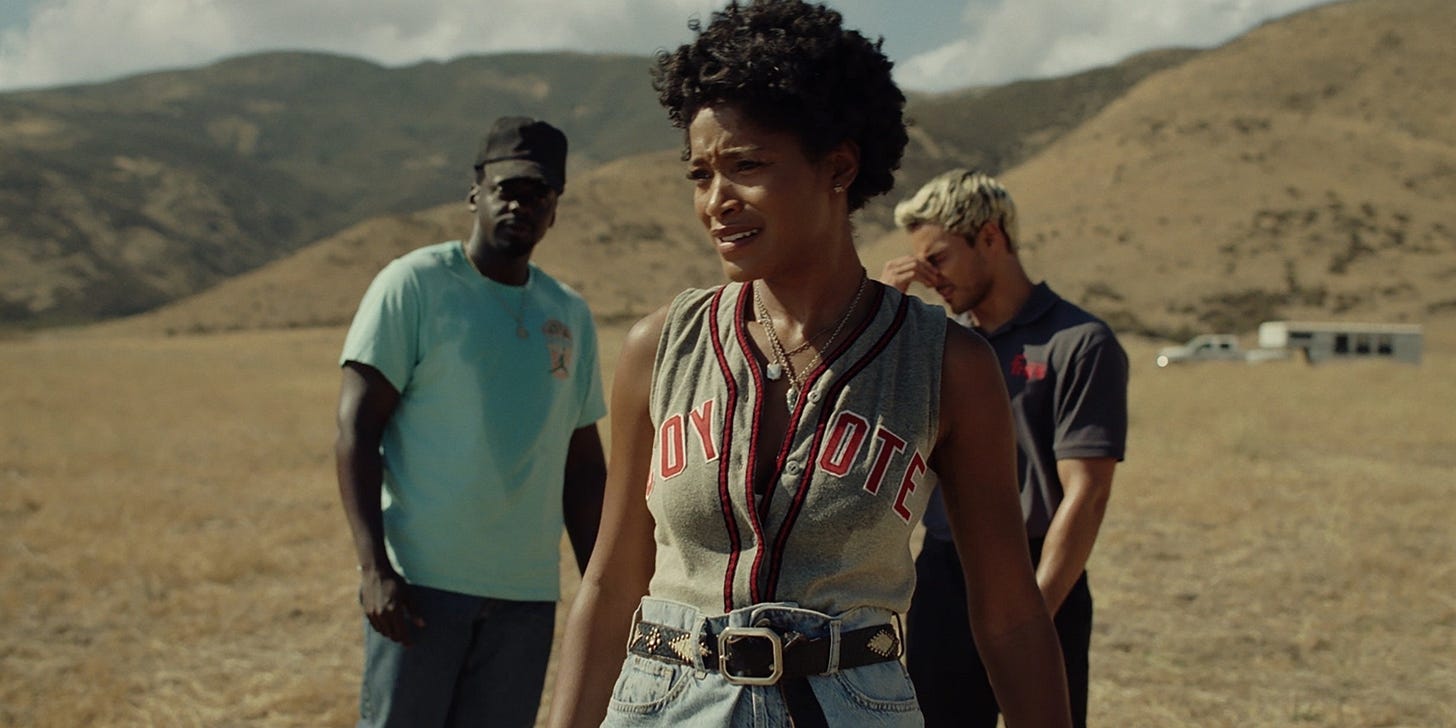Nope
Jordan Peele's third film is his most straightforward—a standard creature-feature that only ever postures at the director's trademark thematic complexity.
Jordan Peele has long-shed his reputation as a sketch comic in favor of becoming a modern “prestige” filmmaker across both movies and television. Whether or not his net contributions to Serious Cinema™ are worthy of the reputation seems to be up for debate in various online film discourse circles, but personally, his first two directorial feature outings (Get Out and Us) are more than strong enough to warrant the head-turns he’s regularly garnered ever since becoming a director.
Unpopular as it is, I actually think Us is better than Get Out, though not for the reasons originally articulated in my review (which I now find hard to read). It’s not that it’s “less concerned with its concurrent real-life sociopolitics and more interested in being fun;” these days, I’d argue that Us is even more nuanced and powerful than Get Out in how it deals with its themes of inequality and nationalism, while also being spookier and more fun.
Regardless, Peele’s upward trajectory, albeit only across two films, had me very excited for his third: this weekend’s extraterrestrial thriller, Nope.
Unfortunately, I think this one may be his weakest. It’s a pretty conventional creature-feature with, I guess, a little bit to say about the pursuit of spectacle and the ignorance of man toward animal nature. I say, “I guess,” because the thematic elements occupy only a small portion of the film’s creative energies, most of which are directed toward creating a cut-and-dry (though admittedly very pretty) thriller about an extraterrestrial visitor wreaking havoc on a desert ranch.
Daniel Kaluuya and Keke Palmer star as OJ and Emerald, siblings who inherit their family movie-horse ranch, Haywood Hollywood Horses, when their father is killed outside their house by what’s purported to be falling debris from a passing airplane. OJ and Em aren’t prepared or equipped to carry on their father’s failing business, and are struggling for a solution.
Meanwhile, the horses and the electrical power start acting up, and OJ’s suspicions that something more sinister led to his father’s death are further affirmed by a nearby cloud that doesn’t seem to move at all during the day, and a dark, disc-like shape that jumps from cloud to cloud at night.
He and Em conspire to get “the shot”: irrefutable proof that they’re being terrorized by something from another planet, in hopes of accruing fame and fortune for their discovery. And so begins the hunt for their great white whale.
There’s more to it than just the aliens and the ranch; a nearby UFO/Western-hybrid-themed amusement park, owned by Ricky ‘Jupe’ Park (Steven Yuen), has taken notice of the strange happenings in the sky and seeks to capitalize on the lucrative spectacle.
We’re also drip-fed details about Jupe’s failed acting career, and how he walked away from the industry after a bizarre catastrophe resulted in heavy casualties on the set of his sitcom, with the implicit promise that it will somehow tie into the mystery of the being in the sky. Unfortunately, it doesn’t come back into the A-plot in a satisfying way, and winds up feeling like a hollow threat for the sake of building suspense and mystery.
Unless I missed some heavily-layered subtext (which is possible), Nope is, by far, Peele’s least politically-charged film. And that’s perfectly fine, if you can still manage narrative intrigue and emotional stakes in the absence of that; Peele struggles to.
The cast gives compelling performances, and the contrast between Palmer’s exuberance as Em and Kaluuya’s quiet restraint as OJ makes them an interesting pair. But it’s largely charisma; Em and OJ are quite likable, but not thoroughly developed, so when tensions are riding high in the third-act, it’s more the product of broad human relatability (to the aversion to getting kidnapped by aliens) than any amount of uniquely empathetic depth in the characters.
Likewise, the script offers plenty of fun banter between Em, OJ, and their Fry’s Electronics camera installation guy Angel (Brandon Perea), but there isn’t exactly a lot of context provided to enhance our understanding of their relationships to one another or anything around them. I could’ve gone for a more thorough exploration of what Haywood ranch means to Em and OJ, or why the film’s title is significant, aside from OJ saying it a couple times.
The scope of the action/thrill sequences is impressive and stimulating, but Peele’s knack for building tension and delivering on suspense, as showcased in Get Out and Us, is notably less present here. The scenes that announce themselves as the spooky ones quickly come and go, relieving you of the terror before it really gets started. And the final conflict becomes so large and clear in vision that fear ceases to be the operative emotion long before the scene is resolved.
All this is not to say Nope isn’t a good time. It certainly takes advantage of the theatrical experience; I saw this in Dolby Cinema and would highly recommend it. In fact, I don’t think this would be nearly as interesting on your household TV, without an expensive setup. The sound design, along with Michael Abels’ score and Hoyte Van Hoytema’s sprawling cinematography, make for a visual palette that does, in fact, scream “Great American UFO story.” I wish the narrative rose to meet that, but it’s a riveting audiovisual experience.



